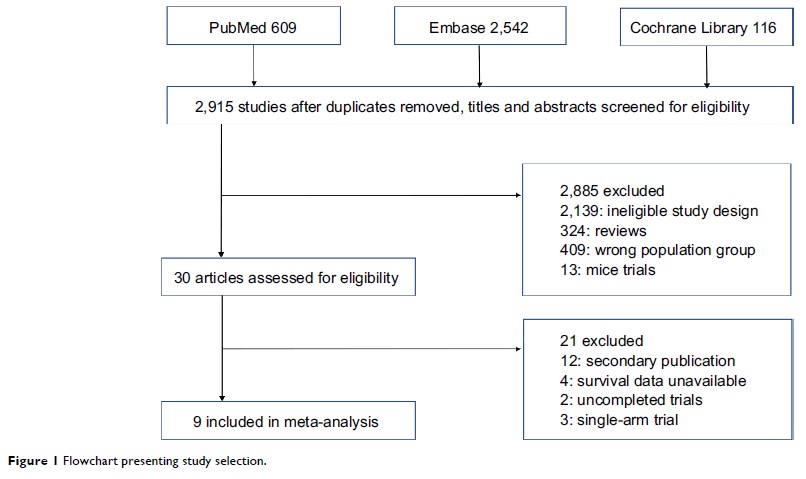9 7 8 1 6
论文已发表
注册即可获取德孚的最新动态
IF 收录期刊
- 3.3 Breast Cancer (Dove Med Press)
- 3.4 Clin Epidemiol
- 2.5 Cancer Manag Res
- 2.9 Infect Drug Resist
- 3.5 Clin Interv Aging
- 4.7 Drug Des Dev Ther
- 2.7 Int J Chronic Obstr
- 6.6 Int J Nanomed
- 2.5 Int J Women's Health
- 2.5 Neuropsych Dis Treat
- 2.7 OncoTargets Ther
- 2.0 Patient Prefer Adher
- 2.3 Ther Clin Risk Manag
- 2.5 J Pain Res
- 2.8 Diabet Metab Synd Ob
- 2.8 Psychol Res Behav Ma
- 3.0 Nat Sci Sleep
- 1.8 Pharmgenomics Pers Med
- 2.7 Risk Manag Healthc Policy
- 4.2 J Inflamm Res
- 2.1 Int J Gen Med
- 4.2 J Hepatocell Carcinoma
- 3.7 J Asthma Allergy
- 1.9 Clin Cosmet Investig Dermatol
- 2.7 J Multidiscip Healthc

辅助 EGFR 酪氨酸激酶抑制剂对根治性切除术后不同阶段非小细胞肺癌患者的不同影响:一项更新的综合分析
Authors Lu D, Wang Z, Liu X, Feng S, Dong X, Shi X, Wang H, Wu H, Xiong G, Wang HF, Cai K
Received 18 September 2018
Accepted for publication 8 February 2019
Published 2 April 2019 Volume 2019:11 Pages 2677—2690
DOI https://doi.org/10.2147/CMAR.S187940
Checked for plagiarism Yes
Review by Single-blind
Peer reviewers approved by Dr Colin Mak
Peer reviewer comments 3
Editor who approved publication: Dr Rituraj Purohit
Purpose: A
survival improvement was achieved with adjuvant chemotherapy in non-small-cell
lung cancer (NSCLC) patients, but its differential effects among patients with
different stages remained controversial. This study aimed to compare the
beneficial effects of adjuvant tyrosine kinase inhibitor (TKI) therapy with
those of traditional therapy on NSCLC patients, specifically on EGFR-mutant and
stage II–IIIA patients, who might benefit most from such treatment.
Methods: MEDLINE,
Embase, and the Cochrane Library were searched, and the results were screened
independently according to certain criteria by two authors. Disease-free
survival (DFS) and overall survival (OS) with HRs were used as the summary
statistics.
Results: A total
of 2,915 publications were identified and screened. Six randomized control
trials and three retrospective cohort studies of 2,467 patients with acceptable
quality were included. The overall EGFR mutation rate was 48.62%. DFS was
significantly improved in all the patients (HR, 0.77; 95% CI, 0.68–0.88) and in
the subgroup of EGFR-mutant patients (HR, 0.49; 95% CI, 0.40–0.61). The
difference of 5-year OS in the subgroup of EGFR-mutant patients (HR, 0.48; 95%
CI, 0.31–0.72) was statistically significant, while in all the patients (HR, 1.01;
95% CI, 0.85–1.19), the difference was not significant. In the subgroups of
studies in which <50% of patients were in stage I (HR, 0.46; 95% CI,
0.35–0.60) and >30% of patients were in stage IIIA (HR, 0.46; 95% CI,
0.35–0.60), DFS was significantly improved, while in the subgroups of studies
in which <30% of patients were in stage IIIA (HR, 0.90; 95% CI, 0.77–1.04)
and >50% of patients were in stage I (HR, 0.90; 95% CI, 0.77–1.04), DFS was
not significantly improved.
Conclusion: Stage
IIIA NSCLC patients might benefit more from adjuvant TKIs than stage I NSCLC
patients after radical resection.
Keywords: non-small-cell
lung cancer, EGFR tyrosine kinase inhibitor, adjuvant therapy, meta-analysis
